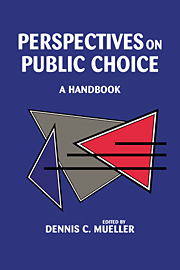Book contents
- Frontmatter
- Contents
- Preface
- Contributors
- 1 Public choice in perspective
- Part I The need for and forms of cooperation
- Part II Voting rules and preference aggregation
- Part III Electoral politics
- Part IV Individual behavior and collective action
- Part V Public choice in action
- 20 Modern bureaucratic theory
- 21 The positive theory of public bureaucracy
- 22 The political economy of taxation
- 23 Rent seeking
- 24 Endogenous protection: The empirical evidence
- 25 Why does government's share of national income grow? An assessment of the recent literature on the U.S. experience
- References
- Name index
- Subject index
21 - The positive theory of public bureaucracy
Published online by Cambridge University Press: 04 May 2010
- Frontmatter
- Contents
- Preface
- Contributors
- 1 Public choice in perspective
- Part I The need for and forms of cooperation
- Part II Voting rules and preference aggregation
- Part III Electoral politics
- Part IV Individual behavior and collective action
- Part V Public choice in action
- 20 Modern bureaucratic theory
- 21 The positive theory of public bureaucracy
- 22 The political economy of taxation
- 23 Rent seeking
- 24 Endogenous protection: The empirical evidence
- 25 Why does government's share of national income grow? An assessment of the recent literature on the U.S. experience
- References
- Name index
- Subject index
Summary
Modern government is bureaucratic, so a theory of government worthy of the name must in no small measure be a theory of bureaucracy. Over the years, however, bureaucracy has resisted theoretical progress, and public administration, whose intellectual terrain this is, has gained a reputation for being far less developed than other areas of political science.
Two barriers to theory stand out. The first is that bureaucracy is a complex subject with no natural focus for analysis. Legislators vote, for instance, but what do bureaucrats do? Similarly, the legislature is organized by committees and party leadership, but what aspects of bureaucracy call for comparable attention and analysis? There are no obvious answers, and scholars have responded by studying everything about bureaucratic behavior and organization that somehow appears relevant.
The second is that these efforts have traditionally been guided by organizational theories from sociology and social psychology, which have not pointed a way out of the thicket. Rather than providing focus and analytic power, they revel in the inherent complexity of bureaucracy. And as generic theories of all types of organization, they have no special interest in politics and are not designed to explore the political foundations of government (Moe 1991).
Public choice is in the process of changing all this, in what amounts to a revolution in the theory of bureaucracy. It did not come easily, and major problems remain. But progress has already been substantial. The turning point came during the early 1980s with the rise of the new economics of organization (Moe 1984).
- Type
- Chapter
- Information
- Perspectives on Public ChoiceA Handbook, pp. 455 - 480Publisher: Cambridge University PressPrint publication year: 1996
- 30
- Cited by



